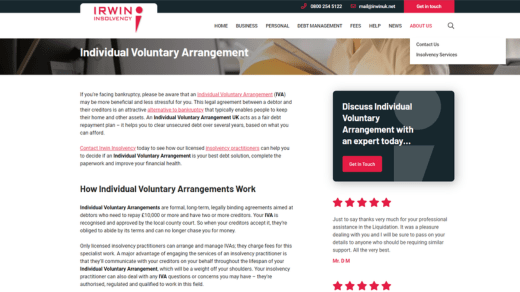Understanding Individual Voluntary Arrangements (IVAs)

An Individual Voluntary Arrangement (IVA) is a legally binding agreement between an individual and their creditors to pay off debts over a specified period. It is a popular debt solution in the UK, offering an alternative to bankruptcy by providing a structured way to repay debts in manageable installments. Here, we explore the key aspects, benefits, and considerations of IVAs.
Key Aspects of an IVA
- Legally Binding Agreement: An IVA is a formal arrangement supervised by a licensed insolvency practitioner. Once approved by creditors holding at least 75% of the debt value, the agreement becomes legally binding on all parties involved.
- Debt Repayment Plan: Typically lasting five years, an IVA allows individuals to make regular, affordable payments based on their income and expenses. At the end of the term, any remaining unsecured debt is usually written off.
- Inclusion and Exclusion of Debts: IVAs cover unsecured debts such as credit cards, personal loans, and overdrafts. However, they generally do not include secured debts like mortgages or car loans, student loans, or certain fines and penalties.
- Role of Insolvency Practitioner: The insolvency practitioner (IP) plays a crucial role in setting up and managing the IVA. They assess the individual’s financial situation, propose the repayment plan to creditors, and ensure compliance with the terms throughout the agreement period.
Benefits of an IVA
- Debt Relief and Financial Control: IVAs provide a structured way to manage and reduce debt. By consolidating multiple debts into a single monthly payment, individuals can regain control over their finances.
- Protection from Creditors: Once an IVA is in place, creditors are legally bound to stop pursuing further action against the individual. This means no more harassment, legal actions, or additional interest and charges on the debts covered by the IVA.
- Avoidance of Bankruptcy: IVAs offer a less severe alternative to bankruptcy. While bankruptcy can have long-lasting impacts on an individual’s credit rating and employment prospects, IVAs are generally seen as a more manageable solution that allows individuals to retain certain assets.
- Flexibility and Customization: IVAs are tailored to the individual’s financial situation, ensuring that the repayment plan is affordable and sustainable. Adjustments can be made if the individual’s circumstances change during the IVA period.
Considerations Before Entering an IVA
- Impact on Credit Rating: An IVA will affect an individual’s credit rating for six years from the date it starts. This can make it difficult to obtain new credit during and immediately after the IVA period.
- Strict Budgeting: Committing to an IVA requires disciplined budgeting. The individual must adhere to the agreed-upon payments and manage their finances carefully to avoid breaching the terms of the agreement.
- Fees and Costs: Setting up and managing an IVA involves fees, which are usually included in the monthly payments. It’s essential to understand these costs upfront and how they affect the overall repayment plan.
- Public Record: An IVA is recorded on the Individual Insolvency Register, which is a public record. This might affect personal and professional relationships, although it is less publicized than bankruptcy.
- Approval and Compliance: Securing approval from creditors can be challenging, and maintaining compliance with the IVA terms is crucial for its success. Any significant changes in financial circumstances should be promptly reported to the insolvency practitioner to adjust the repayment plan if necessary.
Conclusion
An Individual Voluntary Arrangement (IVA) offers a viable solution for individuals struggling with significant unsecured debts. By providing a structured repayment plan, legal protection from creditors, and the possibility of debt relief, IVAs can help individuals regain financial stability. However, it’s essential to weigh the benefits against the considerations, including the impact on credit ratings, the need for strict budgeting, and associated costs. Consulting with a licensed insolvency practitioner can provide valuable guidance in determining if an IVA is the right debt solution for one’s specific circumstances.
Irwin Insolvency for more information.




